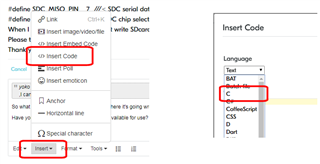i am using nrf52832 in sdk11. I am interfacing motion sensor and spi flash memory. Both motion sensor and spi flash shares spi lines and having different chip select pin.
both working good individually but when i combine them i give spi instance 0 to one device and spi instance 1 to another device. The device having spi instance 0 works fine but data from other device is not coming. i have made spi0 and spi1 enabled in sdk_config.h and also tried with chip select with gpio, but nothing works...



